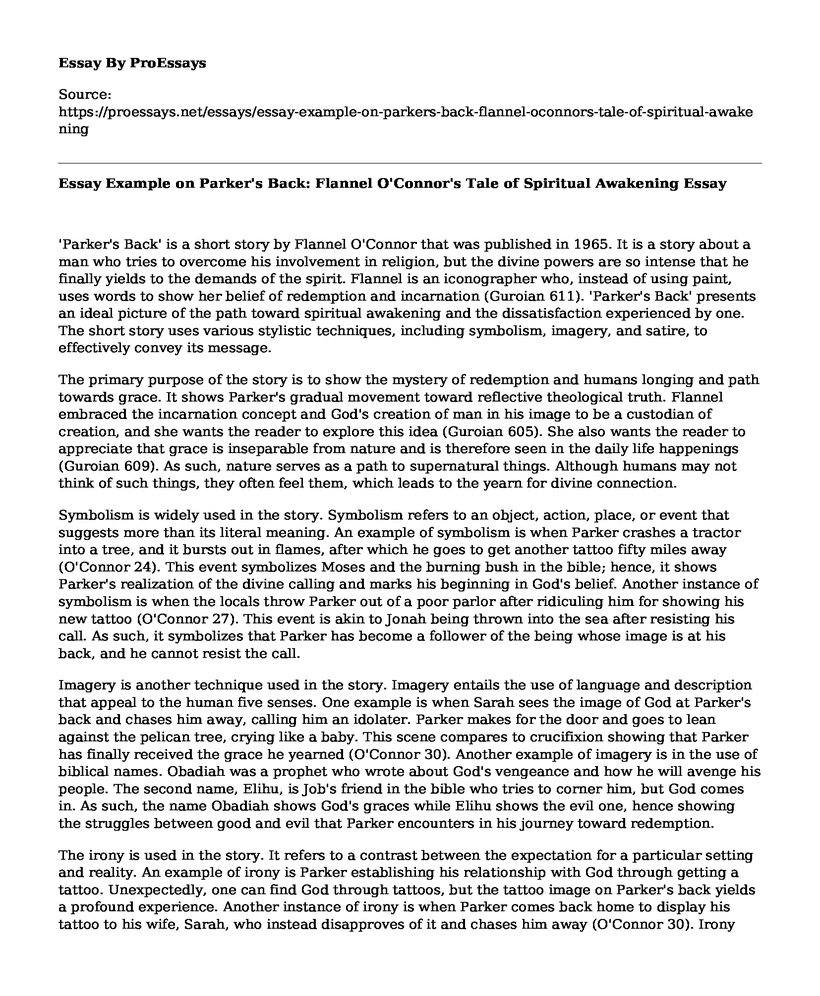'Parker's Back' is a short story by Flannel O'Connor that was published in 1965. It is a story about a man who tries to overcome his involvement in religion, but the divine powers are so intense that he finally yields to the demands of the spirit. Flannel is an iconographer who, instead of using paint, uses words to show her belief of redemption and incarnation (Guroian 611). 'Parker's Back' presents an ideal picture of the path toward spiritual awakening and the dissatisfaction experienced by one. The short story uses various stylistic techniques, including symbolism, imagery, and satire, to effectively convey its message.
The primary purpose of the story is to show the mystery of redemption and humans longing and path towards grace. It shows Parker's gradual movement toward reflective theological truth. Flannel embraced the incarnation concept and God's creation of man in his image to be a custodian of creation, and she wants the reader to explore this idea (Guroian 605). She also wants the reader to appreciate that grace is inseparable from nature and is therefore seen in the daily life happenings (Guroian 609). As such, nature serves as a path to supernatural things. Although humans may not think of such things, they often feel them, which leads to the yearn for divine connection.
Symbolism is widely used in the story. Symbolism refers to an object, action, place, or event that suggests more than its literal meaning. An example of symbolism is when Parker crashes a tractor into a tree, and it bursts out in flames, after which he goes to get another tattoo fifty miles away (O'Connor 24). This event symbolizes Moses and the burning bush in the bible; hence, it shows Parker's realization of the divine calling and marks his beginning in God's belief. Another instance of symbolism is when the locals throw Parker out of a poor parlor after ridiculing him for showing his new tattoo (O'Connor 27). This event is akin to Jonah being thrown into the sea after resisting his call. As such, it symbolizes that Parker has become a follower of the being whose image is at his back, and he cannot resist the call.
Imagery is another technique used in the story. Imagery entails the use of language and description that appeal to the human five senses. One example is when Sarah sees the image of God at Parker's back and chases him away, calling him an idolater. Parker makes for the door and goes to lean against the pelican tree, crying like a baby. This scene compares to crucifixion showing that Parker has finally received the grace he yearned (O'Connor 30). Another example of imagery is in the use of biblical names. Obadiah was a prophet who wrote about God's vengeance and how he will avenge his people. The second name, Elihu, is Job's friend in the bible who tries to corner him, but God comes in. As such, the name Obadiah shows God's graces while Elihu shows the evil one, hence showing the struggles between good and evil that Parker encounters in his journey toward redemption.
The irony is used in the story. It refers to a contrast between the expectation for a particular setting and reality. An example of irony is Parker establishing his relationship with God through getting a tattoo. Unexpectedly, one can find God through tattoos, but the tattoo image on Parker's back yields a profound experience. Another instance of irony is when Parker comes back home to display his tattoo to his wife, Sarah, who instead disapproves of it and chases him away (O'Connor 30). Irony shows how people experience God's graces and the inability of the world to understand such elements.
Conclusion
Overall, Parker's Back shows the struggles that one faces in their journey toward redemption. It shows that humans have a divine call and cannot resist it for long, eventually succumbing. The story uses symbolism, irony, and imagery to explain the different aspects of grace, including rejection, profound experiences, and connection between biblical incidences and the protagonist's experiences. The use of different styles and techniques makes the story exciting and ensures effective delivery of the story's purpose.
Works Cited
O'Connor, Flannery. Parker's Back. Esquire, 1965.
Guroian, Vigen. "The Iconographic Fiction and Christian Humanism of Flannery O’Connor." Intercollegiate Review 36.2 (2000): 609-615.
Cite this page
Essay Example on Parker's Back: Flannel O'Connor's Tale of Spiritual Awakening. (2023, Aug 12). Retrieved from https://proessays.net/essays/essay-example-on-parkers-back-flannel-oconnors-tale-of-spiritual-awakening
If you are the original author of this essay and no longer wish to have it published on the ProEssays website, please click below to request its removal:
- Essay on Art Politics and Religion
- Essay Example on Personal Perception of Doctor Victors Frankenstein
- Rules of the Game: The Dean Essay Example
- Society vs. People in "Theme for English B" Poem Essay Example
- Essay Sample on Love's Overpowering Beauty: Ligeia by Edgar Allan Poe
- Beowulf: Courage, Heroism, and Respectability of a King - Research Paper
- Essay Sample on Oedipus: Blindly Making Decisions Through Pride & Fate







